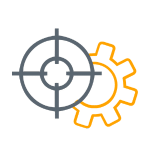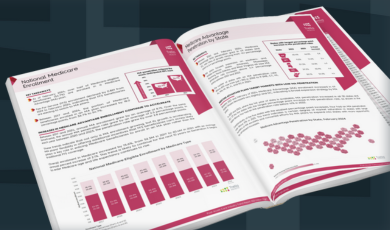A Customer Relationship Management platform, or CRM for short, is an indispensable tool for the healthcare industry, including home health, hospice, skilled nursing, home medical equipment, and infusion organizations. A CRM can streamline workflows, boost productivity, and nurture strong partnerships by centralizing data, automating processes, and improving communication.
Throughout this blog, we will uncover:
- What is the purpose of a CRM?
- Who uses a CRM in healthcare?
- What are the benefits of a CRM in healthcare?
By understanding the power of a CRM in healthcare, you can position your organization for success, enhance patient care, and optimize your operations.
What is the Purpose of a CRM?
In the healthcare industry, especially in post-acute care, using a CRM platform is not just a “nice-to-have” – it’s a necessity. This technological tool is crucial for maintaining connections with high-value referral sources and streamlining work within the organization.
Who Uses a CRM in the Healthcare Industry?
Sales Representatives
How they can use a CRM platform:
Managing Referral Source Relationships
With a CRM platform, sales reps can track interactions with current referral sources and prospects, set reminders for routine follow-ups, and prioritize their accounts.
Route Planning
A CRM can help sales reps prioritize their referral visits based on the urgency of the meeting, the ranking of the account (A, B, or C), or location.
Tip: Using a CRM with a mobile app makes route planning more efficient and productive.
Meeting Preparation
Having detailed notes before and after referral meetings is crucial for sales reps. By using a CRM, sales reps can easily access historical meeting notes, clinical updates, and market data to help build stronger relationships with top referrals in their market.
With a CRM platform, sales reps can track interactions with current referral sources and prospects, set reminders for routine follow-ups, and prioritize their accounts.
“I like pulling up my day on the mobile app and seeing the pre-call plan. Being able to go back and see my notes from my last event and scheduling recurring calls. It’s better than other systems I have used in terms of ease of use.” – Lindsay Errett-Cohen, Account Executive, Dependable Health Services
Sales Managers
How they can use a CRM platform:
Onboarding and Coaching
By utilizing a CRM, sales leaders can streamline their onboarding process for new sales reps as they already have access to customer accounts.
Additionally, sales managers can provide ongoing feedback to individual reps and adjust account strategies.
Territory Optimization
Sales leaders can use the market and competitive data inside an insights platform (like the one offered by Trella Health) to create standardized territories and assign accounts to sales reps, making territory planning less cumbersome. The CRM then assigns these territories and accounts to the reps.
Tip: If you have a CRM platform that is integrated with your insights data, these assignments can be completed easily.
Goal Setting and Performance Monitoring
With a CRM, sales leaders can set goals for the team and individual reps. They can also create dashboards to help track and measure performance and ROI for sales success as needed.
“In our society right now, everything is based on convenience. If you have a solution that can save someone time and make things convenient, it’s a win. This is where I love Trella as a sales manager, because each morning, I am going to get a report of the activities from the prior day. It’s great to be able to view notes and route plans at a glance. Ultimately, the true benefit is the convenience of having these details at my fingertips. It saves me a lot of time.” – Gary Ryan, Sales Manager, ADVance Care Pharmacy
Operations Leaders
How they can use the platform:
Process Optimization
For operations leaders, a CRM can help identify bottlenecks in the referral process and streamline operations for the sales and intake teams.
Business Health Visibility
A CRM can aid operations leaders in tracking performance metrics, referral interactions, and overall business health.
Data Integration
By integrating with an Electronic Health Record (EHR), a CRM can help operations leaders have referral visibility to ensure patients have a smooth transition from the referral source to the service delivery.
They [account executives] plan their work from the office on their desktop computer, and then they use the CRM app on their phone when they’re on the road. So now, when they are in accounts, they not only have the information about the referral source at their fingertips, but we have also integrated the Trella CRM product with our EHR implementation; so all of the orders that go through the pharmacy through the EHR platform are now integrated. – Jay Arnold, Operations Consultant at Vital Care Infusion Services
Executives
How they can use the platform:
Strategic Insights
As an executive, having access to a high-level dashboard is essential. A CRM enables executives to create dashboards that offer an overview of the company’s performance, sales metrics and goals, and market opportunities.
Risk Management
Executives must efficiently analyze large amounts of performance data to stay ahead of opportunities and threats. By utilizing a CRM, executives can closely monitor key metrics, detect potential risks, and take proactive measures.
Reporting and Analytics
When presenting to the board or investors, custom reports and analytics are indispensable for executives. These reports empower executives to emphasize areas of growth and return on investment during their presentations, demonstrating the value of their organization.
“With Trella Health, we found referral sources we should approach, and just as importantly, we determined where we should not spend our time. This knowledge guides our liaisons in terms of effective time management and is aiding our decisions for future growth.” – Norma English, Executive Director, Addus HomeCare
What are the Benefits of Using a CRM in Healthcare
We’ve discussed the users of CRM in healthcare, but what are the advantages?
Below are some benefits of using a CRM in the healthcare sector.
Access Data on-the-Go:
With a mobile CRM, sales reps can access detailed physician information, including referral patterns, utilization rates, and readmission rates. Additionally, they can quickly identify potential referral sources nearby using the heat map and add them to their schedule if they are a good fit.
Enhanced Data-Driven Conversations
Integrating market data with your CRM enables the sales team to create tailored conversations that resonate with physicians. This approach, which goes beyond the traditional coffee and donuts, allows you to showcase your organization’s value, helping you to stay top of mind and stand out among competitors.
Streamlined Workflows
A CRM can assist in streamlining workflows and automating administrative tasks. For example, it can provide event templates that enable sales representatives to create standardized formats for routine events. By streamlining administrative tasks, sales teams can allocate more time to maximize their efforts in the field.
Improved Performance Visibility
A CRM allows company leaders to see how different teams are performing. Sales leaders can track their team’s performance and provide personalized coaching. Operations leaders can monitor performance metrics and referral interactions. Executives can review the company’s performance, goals, and KPIs.
The Power of a CRM in Healthcare
From streamlining workflows to providing performance visibility reporting, a healthcare CRM offers numerous benefits for every department in your organization.
By embracing this powerful tool, your organization can position itself for sustainable success and become a formidable force in the market.
Click here to discover how your organization can benefit from a healthcare CRM.














